Twelve interns, farmers and apprentices attended these two informative workshops on Saturday July 11th, both on small, yet highly productive, urban farms in Philadelphia. The first workshop was in the morning at Greensgrow Farm in the Kensington area of Philly, just north of Center City at Cumberland and Almond. In the afternoon we all drove over to Weavers Way, northwest in Awbury Arboretum, off Washington Lane.
Greensgrow is a stunning example of former chef Mary Seton Conboy's determination to forge an urban garden in the middle of a dilapidated former steel galvanizing site. EPA had cleaned up this one acre of land back before she bought it in 1998 from the city, but the rusted girders and steel beams are in evidence across the street where the new bio-diesel 'plant' has emerged, recycling used restaurant oil into fuel for their Subaru sponsored truck and car.
Most of the farm's promotion and press comes from Mary's own efforts, word of mouth and curious journalists, although a marketing intern was hired this year to help with PR. They've even made it to the Sundance Channel.
Ryan Kuck is the intensely dedicated Lead Farmer at Greensgrow, has his own small farm in the city called Preston's Paradise, and gave us the tour and information about Greensgrow's history. With 4 greenhouses, 3 hoophouses and about 85 farms in their co-op, (from NJ, PA and MD) the farm provides fresh produce and some processed food to the neighborhood and outlying areas. Networking with local farms offers diversity and gives Greensgrow an advantage that other farmers markets don't often have.
Four full-time managers and a seasonal staff of 8-10 keep the farm in production, with an often themed CSA that offers 320 shares to feed 420 households. There is no work requirement for the shares, which cost $725 for a season. The farm accepts Federal WIC (Women, Infants, Children) checks and also offers a winter harvest to 150 members. They do some processing of rice, spelt and oats and also offer a nursery that has tripled in size this year, with plants ready for your own garden. Their community kitchen, begun in St. Michael's Lutheran Church, is a novel business venture to allow for canning, more processing and for residents who pay a small fee in exchange for the use of a commercial kitchen.
Emerald Street Farm offers beautiful produce.
We checked out Greensgrow's hydroponics setup - the farm originally grew lettuces and cooking greens and then sold them to local chefs. The horizontally laid regular rain gutters have a continuous water system flushing through them, monitored by a nutrient counter. Ryan told us that while they only heat for a month in spring and fall, they're scaling back their hydroponics. In the middle of this urban oasis, the temperature ranges 3 degrees warmer than in the suburbs. He emphasized that the farm is a business, as evidenced by sales of hanging baskets and Christmas trees. Renting out space in one greenhouse to an arts design collaborative last holiday season was another way to generate press and work with more diverse groups.
The farm even has an apiary on the property, to one side of the bio-diesel house. To understand how Steve Richter and his son Cody designed the plant, view this video. Cody walked us through the process, but the video makes it all clear. The Greensgrow veggie truck uses this fuel and the farm also sells some of it.
All of Greensgrow's own produce is grown in 12" concrete block edged raised beds, a preventative against any residual metals in the soil. Buckets of rocks are buried in the paths between rows, similar to a french drain. Rotations are made throughout the year, and plenty of herbs are grown to attract bees and beneficial insects. They hired a vermiculture expert to launch a worm bin, popular with local schoolkids. Green roofs have been planted on the composting toilet roof, along with the bio-diesel and walk-in fridge structures' roofs. Drought tolerant Sedum, grasses and native wildflowers require little care. A diagram of the structural design can be found here.
Edward Riehl, the regional Peace Corp representative, was there with a young student from the Ukraine, handing out information about the 1961 organization, and to answer any questions. Ed told us that he's reaching out to farm programs and interns because the Peace Corps is finding it difficult to find volunteers with a wide range of agricultural skills. I was not aware that volunteers receive housing, are paid for 27 months and receive a $6000 're-adjustment' stipend once their program is finished. To find out more, please visit their website or contact Edward: eriehl@peacecorps.gov
Watch for Greengrow's sustainability series of workshops and other partnerships across the city. Many thanks to Ryan and Mary for hosting the workshop and to everyone who came, especially those who travelled more than an hour to get into the city!
Weavers Way Farm leases their land from the beautiful Awbury Arboretum, northwest of Greensgrow in the East Germantown neighborhood of Philadelphia. David Siller is the Farm Education Manager who gave the workshop and tour. They also developed a CSA at Saul High School of Agricultural Sciences, have gardens at MLK High School and manage the farm at Stenton Family Manor, a temporary housing shelter for families in transition.
Weavers Way Co-op is one of the most successful and oldest in the country, having launched in 1973. Many early members still buy from the store, which has expanded to a row-home next door in Mt. Airy. There is a new store in Chestnut Hill and Weavers Way Farm sells wholesale to the co-ops as well as to Headhouse and the Reading Terminal markets in downtown Philly. No work requirement for any of the Weavers Way stores, it's optional with a subsequent discount on produce.
The farm began in 2000, with the help of General Manager Glenn Bergman and other partners in the city who thought a sustainable farm would be a good idea in the neighborhood. The farm pays rent to the arboretum and is not certified organic, but doesn't do much spraying. Again, a lot of rotation of crops, low use of BT and Surround, combined with Pyrethrins. David is also growing herbs and flowers to attract beneficial insects and birds. Comfrey, Anise Hyssop and Alliums are just a few of the flowering herbs and bulbs that we saw growing in various gardens.
David Siller (without the hat).
Dave took us on a tour of the farm with his young farming assistant Z:Kiya at his side, showing the mere foot wide paths between vegetable rows that he rototills, throwing soil up into what become raised beds. The Pennsylvania Horticultural Society donated a huge 60'x30 new heated and cooled Greenhouse, and Philadelphia University built their new washing station as part of professor Rob Fleming's 'Green Design Build' course, view the interesting video here.
Partnering with these groups and more, Weavers Way distributes seedlings throughout the city and donates produce to shelters. They also want to be able to offer nutritional education and more options to actually cook the produce. Because some of the soil still contains lead and metals, soil tests are conducted every year.
The farm is experimenting with a variety of exotic vegetables and plants like Castor Bean plant, Stevia, which is amazingly sweet, Strawberry Spinach and Walking Stick or Tree Collards, the largest collards I'd ever seen. There was also a brilliant alizarin crimson Amaranth in the Children's Garden. Peanuts, sweet potatoes, corn, string beans and tomatoes are all grown here to entice the kids and educate them about local food production. A parent or chaperone accompanies the groups of kids, but David suggested that limited factors to the program are busing and costs of getting the children out to the farm. They can walk if they're local.
It's obvious that not only does David have a passion for farming and growing unusual plants just for the sake of the experiment, but that he inspires the children with his own contagious enthusiasm and curiosity.
Castor Bean plant
Artichoke
Tree Collards
Wild Chenopodium is also called Strawberry Spinach. The fruit isn't especially sweet, but the leaves can be used in salads.
Weavers Way employs 3 full season apprentices and 2 full-time employees or farm managers. The Philadelphia Orchard Project also maintains a small plot of land for their trees.
Thanks to David, Z:Kiya and Weavers Way for hosting this workshop. We all enjoyed the tour and seeing their hard work of creating a food paradise in the middle of an urban park.
Next SAITA workshop on Incorporating Honeybees into the Farming System is Friday evening July 17th from 5pm-7pm at Two Gander Farm in Oley, PA. (Berks County)
Happy growing! See schedule and addresses for workshops here.
Victoria Webb
SAITA Coordinator
vic@furiousdreams.com



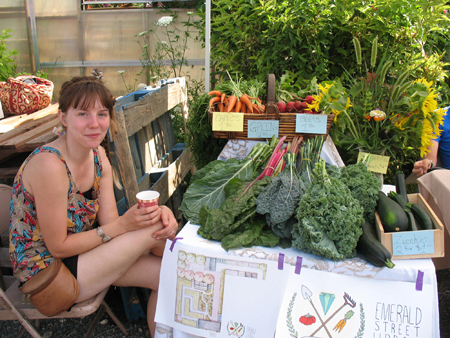

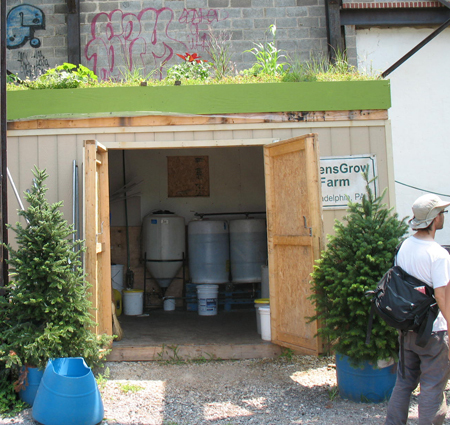
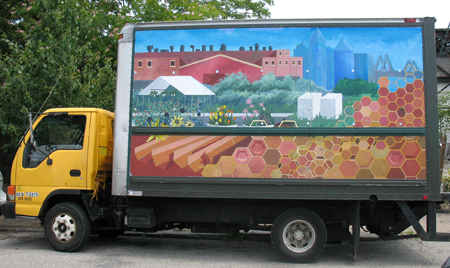


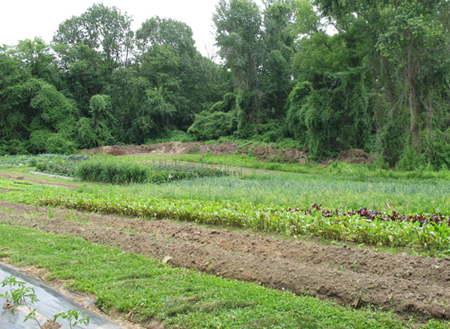





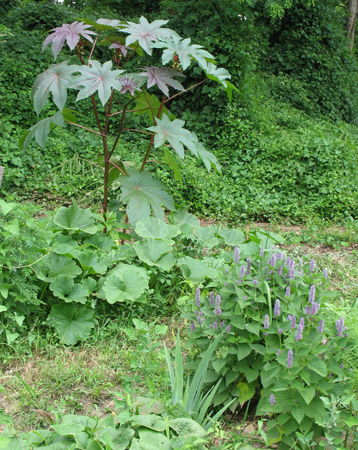



Thanks for the post, we will post your Hydroponic strawberries article. I will post for our customers to see your articles on your blog Hydroponic strawberries
ReplyDelete